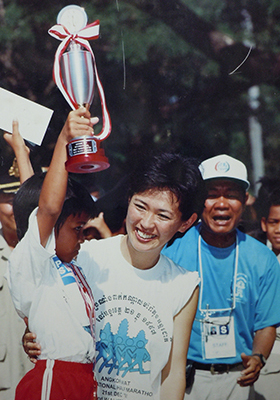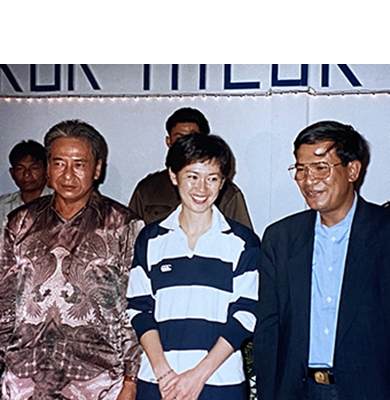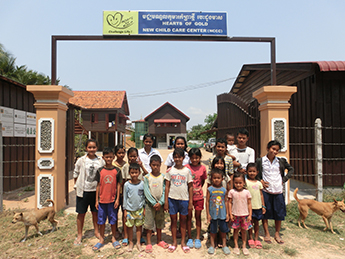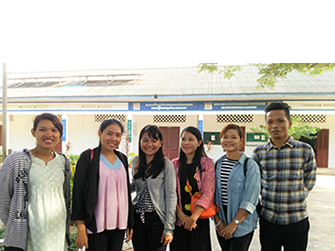
Interview with the Recipient of the 2019
Japan Foundation Prizes for Global Citizenship
From Communities to the World: Initiatives to Connect People <3>
December 22, 2020
Many organizations engage in international cultural exchange programs throughout Japan with the aim of promoting community development through arts and culture, building a multicultural society and promoting international mutual understanding. Established in 1985, the Japan Foundation Prizes for Global Citizenship is intended to support organizations that endeavor to strengthen ties and networks among citizens both inside and outside Japan and share the knowledge, ideas and expertise through intercultural exchange.
One of the recipient organizations of the 2019 Japan Foundation Prizes for Global Citizenship, which marked its 35th anniversary, was Hearts of Gold (Okayama City, Okayama Prefecture). We asked Arimori Yuko, the organization's representative director and also a two-time Olympic medalist for the women's marathon, about the possibilities of international cooperation through sports.
Hearts of Gold
The Power of Sports to Bring Change across National Borders
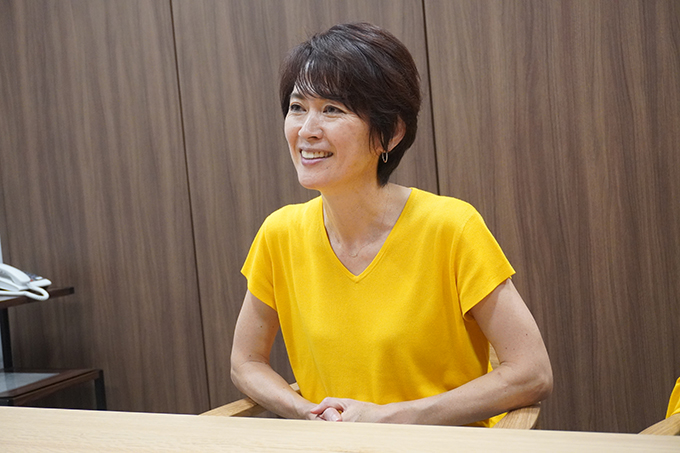
Arimori Yuko, representative director of Hearts of Gold
――You won the silver medal in the women's marathon at the Barcelona Olympics in 1992 and the bronze medal at the Atlanta Olympics in 1996. What led you to launch Hearts of Gold from your standpoint as an athlete?
Yuki Hajime of Sankei Sports newspaper, who was instrumental in establishing the Osaka Women's Marathon, led an initiative to launch the 1st Angkor Wat International Half Marathon, which was inaugurated in 1996. This marathon was an event carried out under Runners Aid (an activity for donating a portion of participation fees from citizen marathons to support developing countries). Marathons were the first to use this donation scheme to promote international charity through sports. As I had just won a medal at the Atlanta Olympics, he asked me to participate as a guest runner, saying, "You have been running just for your own sake. Why not run for others?"
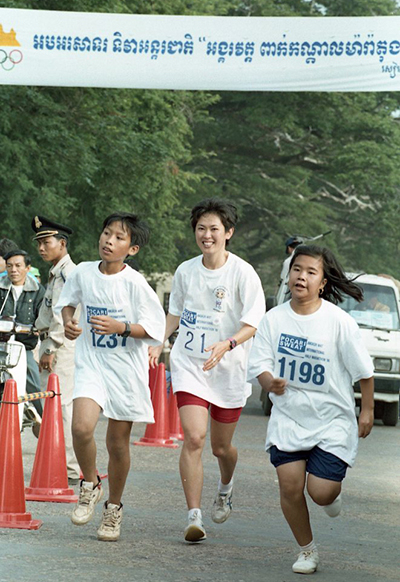
At the first marathon, Ms. Arimori (center) heads toward the finish line together with local children (photo courtesy of Hearts of Gold)
Around this time, I just happened to watch a TV program featuring the activities of an organization called The Cambodia Trust. The organization creates prostheses for survivors of antipersonnel landmines in Cambodia. I was keenly interested in the detailed handwork involved in making these prostheses and wanted to visit the production workshop. I was then approached to be a guest runner in the marathon. I decided to accept the offer when I learned that the proceeds from the marathon would be donated to The Cambodia Trust and that I would get to visit the workshop. Prior to participating, I had no knowledge of circumstances in Cambodia. On my first visit, I saw sights that I'd never witnessed in my entire life. There were many places where I just gasped, "My goodness."
Most participating runners in the first marathon were Japanese, with local children lining the course at even intervals and waving flags of support. For the event, we brought and handed out goods to them, which was a common practice of charity back then. The children kept getting back in line to pick up more goods. I don't know if it was a good idea, but handing out goods was the only type of support we could think of. At the same time, I also had mixed feelings about the wisdom of holding the event in the first place. Do these people really need a sports event under these difficult conditions? When they are struggling just to get by, wouldn't it make things worse if they exhaust all their physical strength by participating in sports and then go hungry? I was able to learn so much on this visit, but I assumed my first guest invitation would also be my last.
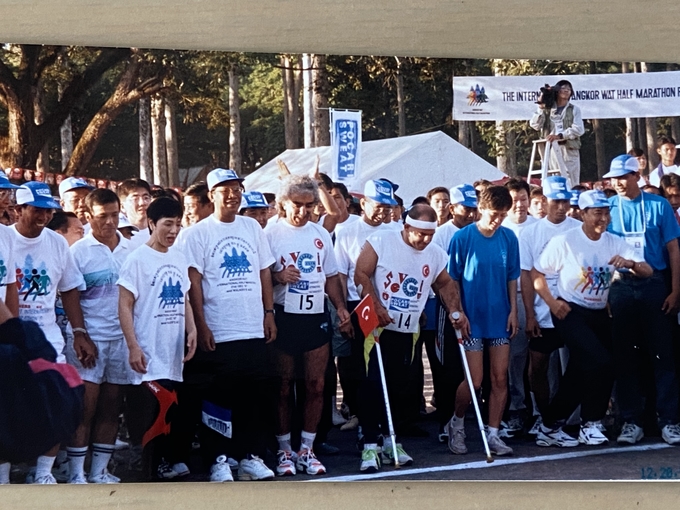
At the starting line of the second half marathon, Ms. Arimori is shown third from the right and Hun Sen, the Second Prime Minister of Cambodia, is fourth from the left in the front row. (Photo courtesy of Hearts of Gold)
To my delight, however, I was invited back again in 1997 even though Cambodia was teetering on the brink of a civil war. I heard all the other potential invitees declined. To be honest, I was hesitant as well. But Mr. Yuki's rationale was, "It's precisely in challenging times like these that we should get involved."
This was the only thing that I could do, and perhaps that based on my past accomplishments. So I thought that if I could make the most of what I can offer, why not try? I also enjoy doing things other people ordinarily don't do (laughs). In the end, I ventured back again to Cambodia although I had no idea what was going on in the country. For better or worse, what I witnessed on my second visit was in stark contrast to what I experienced on my first trip. It was tense and uneasy. In fact, holding a marathon in these conditions seemed next to impossible. To help assure the marathon's safety, Cambodia's First and Second Prime Ministers were invited to the marathon venue. They agreed to run side by side, which was broadcast on local television. The sight of these two rival prime ministers running together demonstrated to the world that Cambodia was now a nation at peace.
――The Prime Ministers themselves ran?
Yes, but only for about 30 meters. The area around Angkor Wat was filled with people, which was both uneasy and lively at the same time. Although the children didn't have much at the first marathon, they cheerfully came to the second event, all smiles, wearing the clothes we handed out on our first visit. They seemed to have been looking forward to this event. Their abounding energy made me realize the wonderful possibilities of sports. I was surprised to witness how much a single marathon could transform people and the atmosphere. Although sports was my means of living, the event made me realize for the first time that sports can indeed make a difference. I felt so happy that I was a marathon runner and was able to contribute to something positive like this. This event got me involved in support activities. It felt refreshing and joyous to realize that sports has the power to drive change and that we could promote change as something positive for everyone regardless of their nationalities. It was such an overwhelming experience that I was even happier than when I won the Olympic medals.
――So this was the starting point for the launch of Hearts of Gold in 1998.
For the third marathon, rather than merely getting invited, I wanted to be involved on a deeper level. My participation in the first two marathons made me want to live a fuller life, so I wanted to create a framework that would allow the marathon event to be held on a continuous basis. That's why I decided to launch a sports NGO that hadn't existed at the time. I received valuable advice from Mr. Yuki, who launched the 1st Angkor Wat International Half Marathon. I was also advised by the NGO The Association of Medical Doctors of Asia (AMDA)*¹, which participated in the report panel exhibition at that event. Lorraine Moller, the bronze medalist in women's marathon at the Barcelona Olympics, also joined us and the NGO was launched, with me serving as representative.
Back then, the secretariat for Hearts of Gold consisted only of Tashiro Kuniko (current secretary general and deputy representative director) who worked at AMDA. The rest of the staff were all volunteers.
――So your organization has been supported by not just people involved in international cooperation and marathons but also by various people.
That's right. Two students who wished to be involved professionally in international activities through sports joined because we were the only organization of its kind. One of these students, Yamaguchi Taku (currently Assistant Professor of University of Tsukuba), was dispatched to Cambodia as the director of the Asian Regional Office after finishing graduate school. By establishing a local office, we asked him to communicate extensively with local people. Different countries naturally have different sets of values, which sometimes created barriers to exchanges and communications. By this time, the people who launched the Angkor Wat International Half Marathon had no longer been involved and all operations were suddenly transferred to Hearts of Gold. We were thrown into a state of utter confusion both on the Japanese and Cambodian sides.
――How did you overcome communication barriers with the local people?
We just kept talking with them until we understood each other. I think they were tired of that (smiling wryly).
――Did you repeatedly persuade them?
I'm not sure whether I'd call it persuasion. We asked the Cambodian side how they wanted to handle this, as it was really important in that they were organizing the event. It mattered what they were able to achieve along with what they wanted to do. If there were things in which they needed assistance, we were happy to help. The experience made me wonder what exactly the essence of assistance or support activities was.
Around this time, I was in Cambodia in my capacity as a Goodwill Ambassador for the United Nations Population Fund (UNFPA), which made me keenly aware of what support activities actually entail.
――The operation was transferred completely to the Cambodian side at the 18th marathon in 2013. Did the mindset of the local people gradually shift?
It actually took quite a long time. The political situation in Cambodia was unsettled. This meant we had to spend considerable time just to continue our activities and to link all the small initiatives together and expand these into one large framework. It involved a lot of hard work for Cambodia's Ministry of Education, Youth and Sport to create an organization to promote the spread of physical education in the country. We constantly communicated and received guidance from the Japan International Cooperation Agency (JICA) as we prepared for our next activities while gathering information. I also paid calls on successive Japanese ambassadors to Cambodia each time I traveled to the country, and they were extremely helpful.
We sketched a picture of a prosperous Cambodia if its citizens could become physically and mentally healthy through sports and physical education by firmly establishing sports throughout the country as symbolized by the marathon.
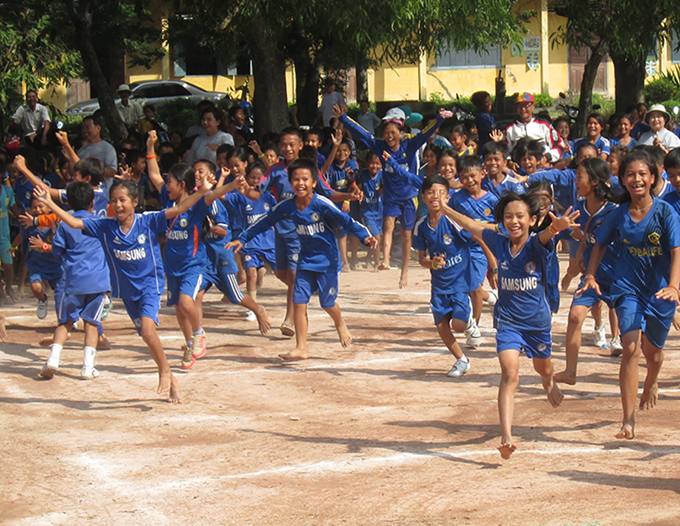
Children rejoice in victory at an elementary school athletic meet in Cambodia. (Photo courtesy of Hearts of Gold)
――Did the local residents welcome you from the beginning?
Basically, yes. But we still encountered some bumps in the road along the way. When we disagreed on points of view, we needed to sit down and discuss. Sometimes the local people did not show up for meetings (laughs). I think all of us really hung in there and persisted. At the same time, there were persons who were serious about nation-building in Cambodia. Working closely together is why our activities ultimately took root in the local communities. On the Hearts of Gold side, the efforts of staff members at the secretariat led the way locally rather than anything I did personally.
――Was the operation of the marathon transferred to the Cambodian side at their request?
Yes. Around this time, the Cambodian side was beginning to feel frustrated that they hadn't had total control over organizing the marathon after so many years. After careful consideration, we came to think the time was right to do so. We held discussions regarding the complete transfer and then concluded a memorandum of understanding promising that the marathon's purpose and charity would be passed along and that the event would be operated in a transparent manner. The memorandum of understanding concluded with, "The Angkor Wat International Half Marathon is organized as a symbol of friendship between Japan and Cambodia and contributes to the development of sports in Cambodia."
At the request of the marathon organizers, it was decided that I would serve as the Honorary Chairman for the rest of my life as the representative of the Japanese organization involved in the marathon management and that I would be invited every year to the event. The marathon was transferred completely in 2013.
――How are they managed in recent years?
Even after the transfer, the marathon is still thriving as the number of runners and participating countries are increasing. Nonetheless, holding a marathon in Cambodia can be precarious. The organizers are really making their all-out efforts, though. They were once told unexpectedly by the government to change the starting line because they were holding a different event there at the same time. International competitions can't change their course so suddenly like that. In fact, any such abrupt changes could jeopardize the marathon's designation as an official race by the Association of International Marathons and Distance Races (AIMS)*².
――It's obviously difficult to determine how much to respect the marathon organizers' wishes and how much to compromise.
Basically, we are not in a position to make a decision on their behalf. It will always be somewhat uncertain to me to clearly understand for whose benefit we are engaging in these activities. We believe we are doing good things, but doing so can be really exhausting (laughs). Having said that, these experiences can open up a new path in life for both sides. They made me realize many things. It may have begun as doing something good for somebody else, but these experiences were also beneficial for me. Personally, I think that everything ended up well.
――You've been active in this event for over 20 years, so participants who were children at the beginning are already adults now.
That's right. Young people and children who participated back then are now in their 20s. Some have even joined the Cambodian office as staff. I'd like to focus more on human resources development in the future. Although I haven't yet formulated any plan for this, it might be a good idea to bring promising Cambodian staff over to work at the Japanese secretariat. In this respect, providing extensive education and properly developing human resources is key. I thought this was true with the United Nations' activities as well. It's not about deciding good from bad or right from wrong. Rather, I believe that what really counts is to provide proper educational opportunities and develop physically and mentally healthy people.
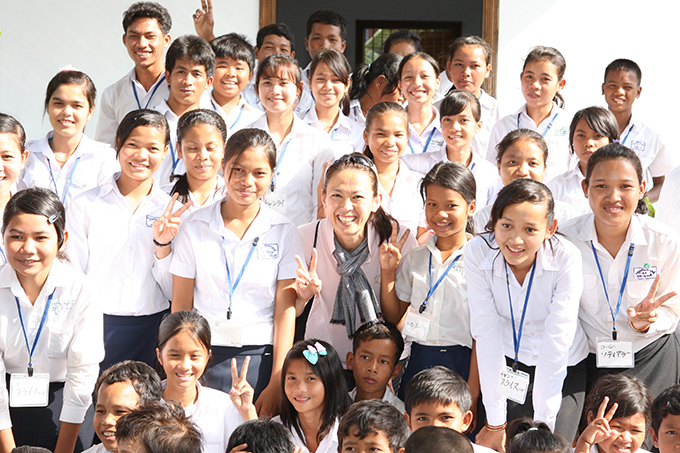
Ms. Arimori surrounded by students in the Japanese-language class. Among these, five have come to study in Japan. (Photo courtesy of Hearts of Gold)
――Hearts of Gold is expanding its activities both regionally and in Japan, for example, by accepting international students at schools in Okayama Prefecture, where you are from. Do you expect to shift your focus more on educational activities in the future?
Okayama Prefecture has been very supportive, so it is easy to engage in activities locally. There are also schools that undertake activities together with us. It is heartening to see underprivileged Cambodian children grow and become independent through opportunities to study abroad or teachers return home who are motivated after gaining experience at schools in Japan. I think this kind of human resources development and exchanges, if effective, will serve as an excellent model. I'm really excited about the possibilities. Although events are also effective, we'd like to continue to focus on education.
We've already created study instruction guidelines and a guidebook for elementary and junior high schools in Cambodia. In fact, physical education has been introduced at selected schools. In addition, the first four-year physical education university was opened in the country, educating future physical education teachers. They can then provide instruction at various schools throughout their own country. Though it may take a little longer, I'd like to see a process established in Cambodia for nurturing children through such proper education.
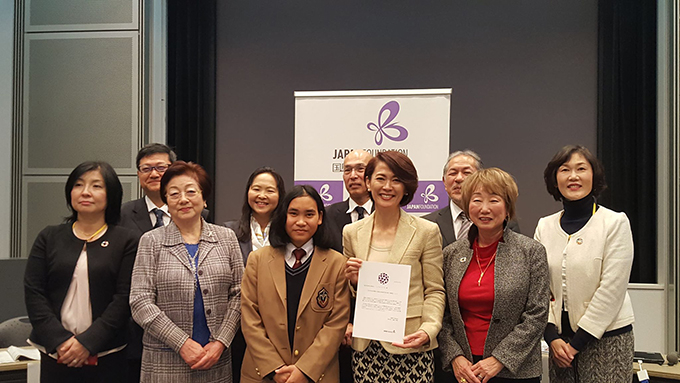
Hearts of Gold staff members share pleasure at receiving the award at the 2019 Japan Foundation Prizes for Global Citizenship presentation ceremony.
*¹ The Association of Medical Doctors of Asia (AMDA)
Deploying its network of branches in 32 countries and regions worldwide, AMDA forms multinational medical teams to undertake emergency humanitarian relief activities mainly in the medical and public health sectors in times of disaster or conflict. The secretariat is situated in Okayama City.
*² The Association of International Marathons and Distance Races (AIMS)
A membership organization consisting of over 450 long-distance races globally in more than 120 countries and regions. The results of the association's accredited races are valid as qualifying times for participating in the Olympics and world championships.
• The video introducing the activities of Hearts of Gold is available on the Japan Foundation's official YouTube channel.
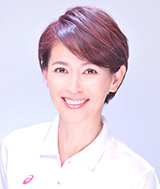
Arimori Yuko
Arimori serves as the representative director of Hearts of Gold, an accredited non-profit organization. She won a bronze medal and a silver medal in the women's marathon at the Atlanta Olympics and the Barcelona Olympics, respectively. Subsequently, she became a professional runner and retired at the 2007 Tokyo Marathon. She participates in competitions and sporting events in Japan and overseas while engaging in international social contribution activities. She is a member of the Sport and Active Society Commission of the International Olympic Committee (IOC), a director of the Japan Association of Athletics Federation, a vice-chairman of the Japan Association for University Athletics and Sport and a chairman of the Special Olympics Nippon Foundation.

Japan Foundation Prizes for Global Citizenship
https://www.jpf.go.jp/e/about/citizen/index.html
The interview was conducted in July 2020 at The Japan Foundation Headquarters Office
Interview and composition: Terae Hitomi (Japan Foundation Communication Center)
* The interview was conducted giving consideration to measures against COVID-19.
Related Articles
Related Events
Back Issues
- 2022.7.27 Beyond Disasters - T…
- 2022.6.20 Beyond Disasters - T…
- 2021.6. 7 Contributed Article …
- 2021.4.28 Crossing Borders, En…
- 2021.4.27 Contributed Article …
- 2021.4.20 Contributed Article …
- 2021.3.29 Contributed Article …
- 2020.12.22 Interview with the R…
- 2020.12.21 Interview with the R…
- 2020.11.13 Interview with the R…


